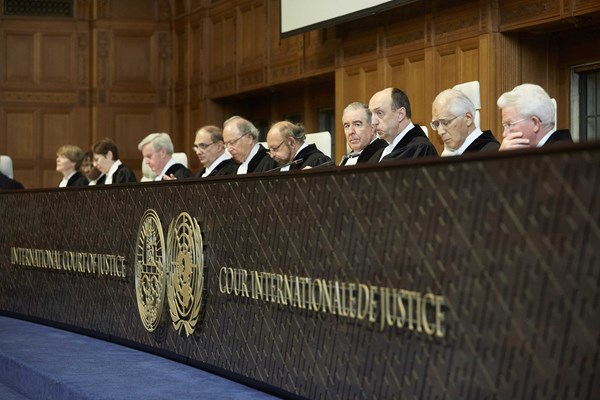The Hague started to review Ukraine’s lawsuit against Russia
On the 6th of March the International Court of Justice in the Hague held the first hearings in Ukraine’s lawsuit against Russia, which Kyiv filed in the middle of January 2017. Ukraine is accusing Russia of violating two conventions – the Terrorist Financing Convention and the Elimination of All Forms of Racial Discrimination. The hearings will take place between the 6th and the 9th of March. They have started with a presentation by the Ukrainian side.
In the lawsuit, Ukraine claims that Russia violated the Terrorism Financing Convention by providing weapons and other types of aid to the illegal armed groups who have committed a series of acts of terrorism in Ukrainian territory. In addition to the lawsuit, Ukraine has filed a request for temporary measures to be implemented in order to prevent further violations by Russia during the legal proceedings. Pavlo Klimkin, Minister of Foreign Affairs of Ukraine, expressed on his Twitter account that Ukraine’s primary goal in the context of the ICJ in the Hague is to protect the lives and rights of Ukrainians. Olena Zerkal, Deputy Minister of Foreign Affairs of Ukraine for the European Integration, is Ukraine’s representative at the court. The position of the Ukrainian side at the Hague is also represented by the American professor Harold Hongju Koh and Marney Cheek, a partner in the Covington legal firm, which is representing Ukraine’s interests at international courts on contract. Olena Zerkal noted during the presentation at the court that Russia is committing criminal acts against Ukrainians in the Donbas and in Crimea.
“The Russian Federation continuously violates international law and abuses human rights. The Russian Federation continues to supply deadly assistance to illegal armed groups in Ukraine that have committed numerous terrorist attacks. In the occupied Crimea, the Russian Federation wholly disregards human rights, while implementing policies of cultural erasure [the Crimean Tatar People]… The Russian Federation has continued to engage in this conduct for three years,” Zerkal explained. She mentioned the bombardment of Avdiivka by militants and also Russia’s shipping of arms and ammunition.
“In just two months, since the beginning of 2017, the amount of ammunition used to shell Avdiivka is estimated at almost 15,000 pieces. This amount is equivalent to 14 cargo railway cars fully stocked with ammunition. Meanwhile, the official spokesperson of the Russian president publicly expressed hope that Russian proxies will not run short of ammunition. Can there be any doubt about where all this ammunition comes from? No. It is from the Russian Federation,” the Ukrainian representative stated in court. She also mentioned other acts of terrorism with Russian support:
“The destruction of Flight MH17 with a Russian Buk system [17 July 2014, 298 casualties] did not stop Russian financing of terrorism. With that continued support, we suffered an attack on a bus at Volnovakha [13 January 2015, 12 civilian casualties]. A mere two weeks later, Mariupol was bombarded, and Kramatorsk a few weeks after that. In Kharkiv, a peaceful population was terrified by a string of bombings.”
During the hearing, Professor Harold Hongju Koh stated that not all separatists in the uncontrolled territories of the Donetsk and Luhansk regions are terrorists, but there are terrorists among them. He mentioned that there is a clear definition of terrorism, namely “attacks on civilians”. And it is precisely these events which Ukraine is proving in court.
Ukrainian officials and politicians are certain that the court in the Hague will recognize Russia’s guilt. Yuriy Lutsenko, Prosecutor General of Ukraine, stated that the International Criminal Court (ICC) recognized the evidence of Russian war crimes against Ukraine provided by Ukraine as sufficient.
“Yesterday in the ICC prosecutor’s office, we considered such evidence: during the events near Ilovaisk the Russian Federation brought regular forces of the Russian Armed Forces into the rear of our troops, broke the agreement on “green corridor” for the retreat of our military, who sometimes were outnumbered 18 to 1, and also masked their equipment as Ukrainian,” he said. Lutsenko also noted that Ukrainian side has provided evidence of extrajudicial executions, torture, kidnapping, and summary executions.
“All of this falls under the definition of war crime and crime against humanity. Our evidence was recognized as very serious. There will be further official procedures by the ICC and the Prosecutor’s Office. They could last a long time,” he explained.
Ukrainian MP Hanna Hopko, chairperson of the Foreign Affairs Committee of the Verkhovna Rada, said in a broadcast on “112 Ukraine” that Ukraine is not only presenting its own evidence at the court in the Hague, but also evidence from international organizations.
Experts regarding the Hague Tribunal are not so optimistic. Arkadiy Bushchenko, president of the Ukrainian Helsinki Group, is of the opinion that the Hague Tribunal will consider the case material on Russian war crimes in Ukrainian territory for many years. This is the case with the Georgian lawsuit against Russia, which was filed in 2008 and is still being considered by the tribunal. The Yukos lawsuit against Russia was considered for roughly 10 years, and despite the ruling in favor of the shareholders, Russia refused to carry it out, referring to the fact that it goes against Russian legislation.
Bohdan Yaremenko, former Consul General of Ukraine in Edinburgh and Istanbul and chairman of the board of the “Maidan of Foreign Affairs”, is confident that the ruling of the ICJ on Ukraine’s lawsuit against Russia will not stop the Kremlin’s military aggression in the Donbas, but it will significantly strengthen Ukraine’s negotiating positions when the war ends.
